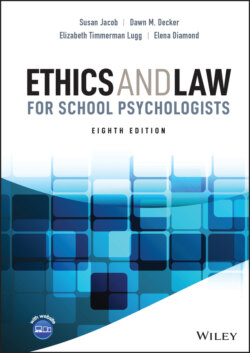Читать книгу Ethics and Law for School Psychologists - Susan Jacob - Страница 72
Due Process
ОглавлениеThe 14th Amendment also provides that no state shall “deprive any person of life, liberty, or property, without due process of law.” Courts have identified two aspects of due process: substantive and procedural. Substantive due process applies to the content of a law. A state may not pass a law that deprives citizens of life, liberty, or property if the law is not related to a legitimate governmental purpose; arbitrary and capricious laws that impact on citizens’ rights will be ruled unconstitutional. In the public schools, substantive due process has been interpreted to mean that school rules restricting student rights must be reasonably related to the purpose of schooling (see the discussion of Tinker v. Des Moines Independent Community School District [1969] later in this chapter).
Procedural due process means that a state may not take away life, a liberty interest, or a property right without some sort of procedural fairness to safeguard citizens from unfair or wrongful infringement of rights by the government (Reschly & Bersoff, 1999). The requirement for procedural due process applies only to the infringement or deprivation of a liberty or property interest protected by the 14th Amendment; citizens are guaranteed procedural due process only if a substantive liberty or property interest is affected. The specific liberty and property interests protected under the umbrella of the 14th Amendment have been identified in court interpretations of the scope of substantive rights. In Goss v. Lopez (1975), the Supreme Court held that education is a property right protected by the 14th Amendment.
Procedural due process “is a flexible concept whose precise contours change relative to the nature and gravity of the interest infringed” (Bersoff & Prasse, 1978, p. 402). Notice (being told what action the state proposes to take and the reason for that action) and the opportunity to be heard are basic components of due process when state action may deprive a citizen of a liberty or property interest. Under the due process clause of the 14th Amendment, schools may not suspend or expel children from school (and therefore deprive them of their property interest) without some sort of fair, impartial due process procedures. The due process procedures required for school suspension or expulsion generally do not have to be complex or elaborate but must include notice and the opportunity to be heard (Goss v. Lopez, 1975). (The suspension or expulsion of students with disabilities for more than 10 days requires more formal procedures because of the protections afforded students with disabilities under statutory law. See Chapter 9.)
The due process clause of the 14th Amendment also protects individuals from arbitrary or unwarranted stigmatization by the state that may interfere with the ability to acquire property (Wisconsin v. Constantineau, 1971). More specifically, the courts have ruled that a school may not label a child as “mentally retarded” or “emotionally disturbed” without due process, that is, without some sort of fair decision-making procedure that includes parent notice of the proposed classification and the right to an impartial hearing to protest the classification (see Chapter 4).
As noted previously, the 14th Amendment also protects the basic personal freedoms of citizens outlined in the Bill of Rights from arbitrary infringement by the state. The First and Fourth Amendments are important sources of fundamental rights.
